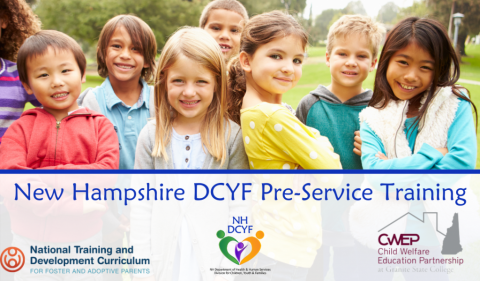
The NH DCYF Kinship Caregiver Training provides foundational knowledge for kinship providers. A Kin or Kinship caregiver can be a relative or an unrelated person who has an emotionally significant relationship with the child or their family. This training is one of the components required for a kindship provider to receive a Kinship Care license in NH. The content is tailored to address the unique challenges of caring for a child who is a family member, or you have a close connection with. Additionally, this training examines how trauma shapes the needs and behaviors of children and the impact it has on their caregivers. Kinship providers will develop an increased understanding of the Division for Children, Youth and Families (DCYF) and gain tools and strategies to meet the needs of children and youth in their care.
This training will be online using a learning management system referred to as Canvas and using Zoom to facilitate class times.
Start Your Course Today
Step 1
Click the button to download the directions for kinship course registration.
Step 2
Click the button to go to the Learn for Life registration page and start your registration.
Step 3
Watch for an email with course information and the links to attend.
Training consists of:
- A Self-Guided course covering the two required topics - Kinship Caregiving and Trauma Related Behaviors.
- A Self-Guided course on Caregiver Pre-Service Basic Medications.
- The total training = 5 credit hours
Below is a description of the topics/themes covered during the NH DCYF Kinship Caregiver Training Cohort:
Kinship Caregiving Overview
This theme acknowledges the complexities associated with caring for a child as a kinship caregiver. Participants will discuss challenges such as divided loyalties and the range of emotions from anger and resentment to feelings of guilt and embarrassment that families may experience. This theme considers how kinship caregivers redefine their roles and relationships with family members as well as discusses strategies for navigating family dynamics and conflicts.
Learning Outcomes
- Examine the complexities of caring for a child as kinship caregiver
- Explore strategies for navigating family dynamics and conflicts
- Recognize the importance of establishing boundaries while redefining roles and responsibilities as a kinship caregiver
Trauma Related Behaviors-Kinship Overview
This theme discusses how chaos, threat, neglect and other adverse childhood experiences can alter the developing brain. The theme also examines how trauma can influence the way children think, feel, and act. Participants will increase their understanding of the major stress responses individuals use to cope with perceived and actual threats and recognize the reasons and symptoms children exhibit. Participants will explore and identify survival skills and coping strategies that result in a complex range of behaviors.
Learning Outcomes
- Recognize how childhood trauma, including abuse and neglect, can impact the developing brain and have a continuing influence on development
- Examine the effects of trauma on children’s behavior
- Develop an understanding of coping and survival strategies children use when they feel threatened or fearful
- Explore triggers and how they may be observable in children’s behavior

